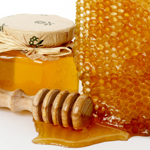Honey and infants don’t mix. Here’s Why:
As a natural sugar, honey may be a preferred sweetener for many health conscious moms. However, raw honey is not for everyone. The American Academy of Pediatrics recommends that raw honey not be given to infants under one year of age because of the rare possibility of being infected with the bacteria that causes botulism (Clostridium botulinum). Once a toddler reaches one year old, their digestive system is mature enough to kill any botulism germs.
What to watch for if your infant has eaten honey:
If your child has eaten raw honey and you are concerned about the risk of botulism, here are the signs and symptoms to look for. Symptoms of botulism typically appear between 18 and 36 hours after the infant consumes the bacteria. Constipation is often the first symptom of botulism that parents notice. Other symptoms, which tend to occur in the following order, include:
- constipation
- flat facial expression
- poor feeding (weak sucking)
- weak cry
- decreased movement
- trouble swallowing with excessive drooling
- muscle weakness
- breathing problems
Infant botulism is a rare illness, affecting only about 100 infants per year in the United States. Most babies will recover fully with proper medical care.
Dr. Jim

